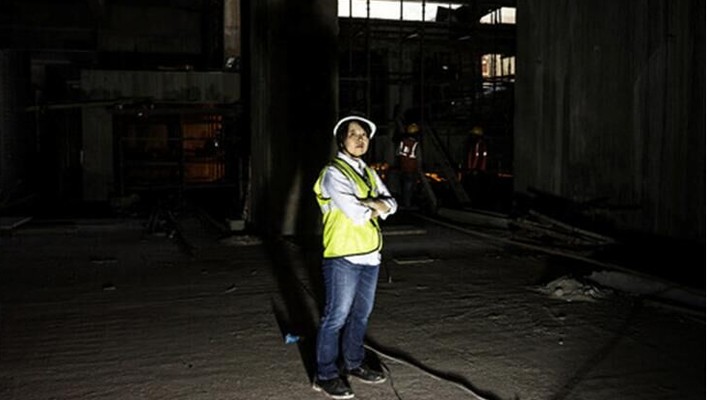Reiko Abe became a civil engineer, but he could not find a job. When a woman in safety vest enters the tunnel under construction there is an old superstition of Shinto that invites anger of the goddess of a jealous mountain and an accident to workers, and that idea was also partially reflected in the Labor Standards Law.
Twenty years later, Mr. Abe became the face of internationalization of Japan, with the aim of overcoming the image of women working in Japan with the less developed countries and barren land. Government advertisement in Japan where Abe appeared was broadcasted on CNN and BBC. Abe was praised by Prime Minister Shinzo Abe as a symbol of Japan’s overseas abilities and promotion of women in Japan. In Japan, women account for less than 5% of managerial positions.
Ironically, Mr. Abe (51)’s workplace is not Japan. After overseeing the safety of Indian subway construction project for seven years, he was promoted to President of Oriental Consultants · India under the umbrella of the ACK Group.
Mr. Abe of safety shoes on a helmet and safety shoes with reflective tape, explained in an interview several times in a month, “I am safe the most important thing”. “Perhaps because I was a woman, I do not want to suffer any danger in any way, and I do not want to encounter the same kind of danger in the same way, because I also have that kind of thing for myself, I think that consciousness is a bit different from engineers.”
Mr. Abe is building a tough schedule. I do not bother to rent home at the hotel. Women are often Abe alone at the workplace, and in many cases they are surrounded by 40,000 male workers. “First of all, the body is sturdy, a tough or flexible person is required, something that cannot be imagined always happens in Japan,” he says.
There is no prospect
After graduating from Yamaguchi University’s Faculty of Engineering, Mr. Abe found that there was no way to go, because of Shinto’s way of thinking and the family’s wisdom concerning the protection of women. The Labor Standards Act prohibiting women from working in underground construction sites and mines such as mines was not revised until 2006.
“No matter how much I study, no matter how much experience I have, I cannot change it, which was a terrible regret.” I had to find a way to overcome that disadvantage, “It was a job in South Asia, which is said to be English and experienced in developing countries, which is said to be particularly difficult, it all became my weapon before I knew it.”
He studied English in less than a year, passed the master’s degree at the Norwegian Institute of Science and Technology. After that I got the training position and finally I was able to work in the tunnel. It is a Norf Cup ocean floor tunnel project that connects the mainland of Norway and Marguerite.
If I was a man, “I probably did not go abroad, although I could work normally in the country, I do not have to bother going abroad, but I had no way to survive abroad. I think that I am glad that it was a woman.” While acknowledging that he was “a representative of Japan’s internationalization,” he confided that he was “really ashamed.”
Mr. Abe in reflective vest said that it is the goal to see the first Shinkansen in India, said that he would not return to work in Japan, “I want to be the top among all Japanese engineers, not just women,” he said his enthusiasm.
